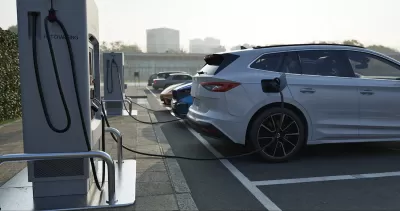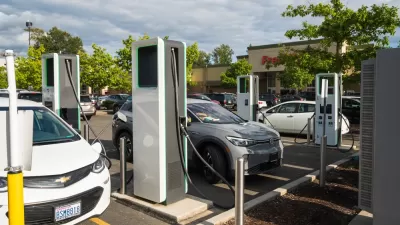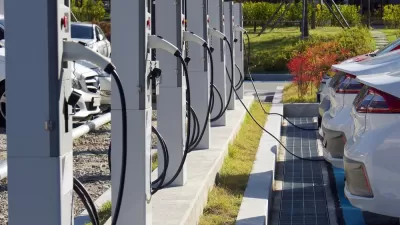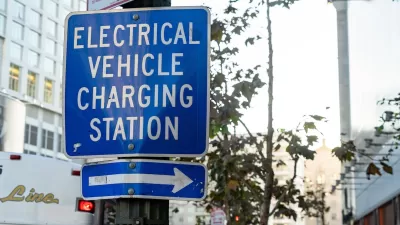The National Electric Vehicle Infrastructure program planned to fund the construction of hundreds of EV charging stations across the country.

The United States Department of Transportation (USDOT) has ordered all states to end their electric vehicle charging infrastructure programs, part of a $5 billion planned federal investment that would develop a nationwide system of EV charging stations to alleviate one of consumers’ main concerns, ‘range anxiety.’
As Aarian Marshall reports in Wired, “Officials at the Federal Highway Administration (FHWA), which manages the program, ordered state transportation directors to “decertify” the plans that all 50 states have used to outline where and how they will build their charging stations, and with what companies they’ll contract to do so.”
The program was designed to install chargers along major freeways and assist jurisdictions that may not be able to afford the cost.
Marshall notes that “The order may be illegal. It could fly in face of court orders demanding the Trump administration ‘unfreeze’ a funding pause that prevents federal money from flowing to state agencies. It may also violate the Administrative Procedures Act, which requires agencies to follow legal procedures before taking action.”
FULL STORY: Feds Halt the National Electric Vehicle Charging Program

Planetizen Federal Action Tracker
A weekly monitor of how Trump’s orders and actions are impacting planners and planning in America.

Congressman Proposes Bill to Rename DC Metro “Trump Train”
The Make Autorail Great Again Act would withhold federal funding to the system until the Washington Metropolitan Area Transit Authority (WMATA), rebrands as the Washington Metropolitan Authority for Greater Access (WMAGA).

DARTSpace Platform Streamlines Dallas TOD Application Process
The Dallas transit agency hopes a shorter permitting timeline will boost transit-oriented development around rail stations.

Renters Now Outnumber Homeowners in Over 200 US Suburbs
High housing costs in city centers and the new-found flexibility offered by remote work are pushing more renters to suburban areas.

The Tiny, Adorable $7,000 Car Turning Japan Onto EVs
The single seat Mibot charges from a regular plug as quickly as an iPad, and is about half the price of an average EV.

Supreme Court Ruling in Pipeline Case Guts Federal Environmental Law
The decision limits the scope of a federal law that mandates extensive environmental impact reviews of energy, infrastructure, and transportation projects.
Urban Design for Planners 1: Software Tools
This six-course series explores essential urban design concepts using open source software and equips planners with the tools they need to participate fully in the urban design process.
Planning for Universal Design
Learn the tools for implementing Universal Design in planning regulations.
Municipality of Princeton
Roanoke Valley-Alleghany Regional Commission
City of Mt Shasta
City of Camden Redevelopment Agency
City of Astoria
Transportation Research & Education Center (TREC) at Portland State University
US High Speed Rail Association
City of Camden Redevelopment Agency
Municipality of Princeton (NJ)





























